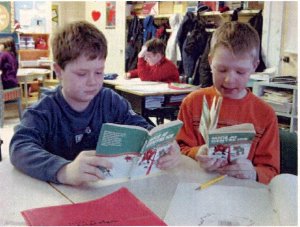
Such forums include talking with classmates and the teacher in literature circles, book clubs and reading groups" (Booth, 2002, p. 53). The words "active" and "action" relate specifically to the literary processes of: Speaking and Listening; Reading and Viewing; and Writing and Other Ways of Representing which are components of a balanced literacy program. Boys' responses confirmed the importance of action talk by stating, "I felt good in Literature Circles... I did like reading and discussing the novels...I liked reading and discussing the informational texts"; "Yes, because I like reading and discussing the informational texts."; "Yes, because I like reading and discussing." and "Yes, I liked Disgasing [sic] more than reading."
Social interaction has been identified as an important component to brain development in the elementary years. Gurian (2001, p.132) states "Brain development and social development during the elementary years are extremely intertwined. The brain learns because it is part of group learning." Similarly, the social constructivist theory of learning, based on the work of Lev Vygotsky (Vygotsky 1978), emphasizes the importance of social interactions of the learner with other people (Au, Carroll & Scheu, 1997). Support for social interaction from the boys' responses included "reading and group work"; "that they (literature circles) were fun and it got me reading more..." and "Yes, because we read together."

Several boys' responses revealed a
combination of both active and social engagement in
the literacy process during literature circles.
Examples of these responses include: "artful artist,
the group members, the projects, the books"; "The
projects, the groups and the people I'm with"; and "I
liked standing up in front of the class and showing them
about are [sic] book. I also liked working with groups."
The majority of boys acknowledged that they were
satisfied with the strategy of literature circles.